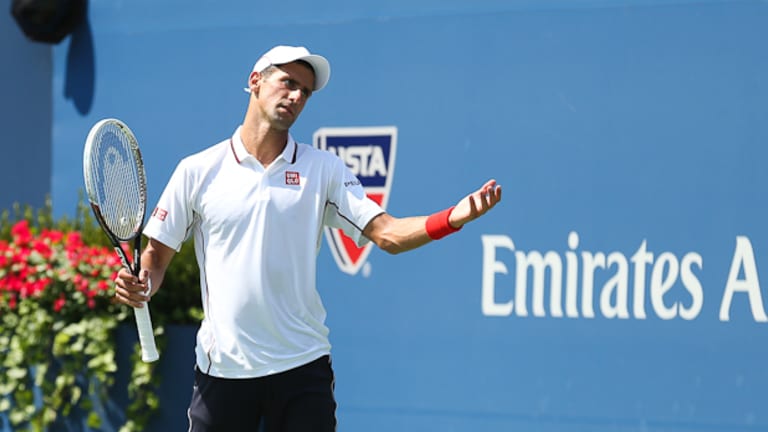NEW YORK—For three hours on Saturday, tennis fans around the world played a long game of “Waiting for Nole” together. Those of us who had watched him on semifinal Saturday at the U.S. Open for the last four years were pretty sure that, even if it took him five sets and five hours, Novak Djokovic would eventually show up, and show his opponent, Kei Nishikori, the door.
In each of the last four Septembers at Flushing Meadows, Djokovic has found himself either on the ropes, or about to go over a cliff, in the semis. Twice he saved match points to beat Roger Federer in five sets, once he came back from a set down to beat David Ferrer, and last year he was down two sets to one before coming back to catch Stan Wawrinka at the finish line. Put all of those matches together and you could begin to understand why, even when he was down two sets to one and a break in the fourth to Nishikori today, even when he seemed to have nothing left in the tank, the betting odds among some bookmakers still favored Djokovic to win.
This time, though, we waited for Nole in vain. We waited through his slow first-set start; through his stunningly awful, and crucial, third-set tiebreaker, in which he double faulted and made five unforced errors; we even waited while he dragged himself, head hanging, to the brink of defeat in the fourth. Surely, once his back was to the wall and the match essentially lost, he would come out firing winners the way he had so often in the past. Instead, Djokovic went away tamely, and was broken in an error-filled final game. Every time he might have been expected to turn things around, he didn’t.
“Well, what can I say?” a spent and down-looking Djokovic said a few minutes after the match. “Other than the second set, my game today was not even close to what I wanted it to be. A lot of unforced errors, a lot of short balls. Just wasn’t myself.”
It has become a post-Wimbledon theme for Djokovic.
After he lost to Jo-Wilfried Tsonga in similarly uninspired fashion in Toronto last month, the Serb said, “I haven’t played even close to what I intended before going to the court. Just nothing was going. No baseline, no serve, no return.”
After he lost the following week to Tommy Robredo in Cincinnati, Djokovic said, “Many, many, many things are not clicking these two weeks on hard courts. It’s unfortunate, but it’s more than obvious I’m not playing even close to what I’m supposed to play.”
